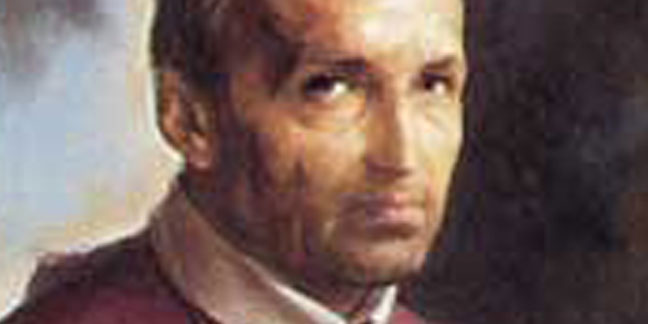On Aug. 1, the Church celebrates St. Alphonsus Liguori, the eighteenth-century bishop who is honored as a Doctor of the Church for his missionary zeal and his accomplishments as a moral theologian.
Alphonsus Liguori was born in Naples, Italy in 1696, the son of a naval officer and his Spanish-Italian wife. He was the first of his parents' seven children, and known in the family for his stubbornness. However, he was also extremely bright and became a virtuoso harpsichordist by the age of 13. Alphonsus loved music, especially opera, and would go on to compose numerous classical works.
As a boy, he did not attend school, but received private tutoring that allowed him to make incredibly rapid progress. By the age of 16, Alphonsus had earned his degree in law. He passed the bar examination and became a practicing lawyer before he had even turned 20. By the age of 26 he had gained a formidable reputation in the courts.
By that time, however, he had also begun to neglect prayer in favor of social functions and a more luxurious lifestyle. He later wrote that these "pleasures of the world" were truly "pleasures which are filled with the bitterness of gall and sharp thorns."
The turning point of Alphonsus' life came in 1723, when he was part of a lawsuit between a nobleman of Naples and the Grand Duke of Tuscany involving a substantial amount of money. Alphonsus misunderstood a critical piece of documentary evidence, and suffered a humiliating defeat in the courtroom. He left the courthouse, never to return, so upset that he did not eat for three days.
On Aug. 28, 1723, while visiting the sick at a local hospital, the young man had a life-changing experience of God. He saw a mysterious light, felt the building shake, and heard the voice of God asking him to "leave the world" and place himself totally in his service.
Alphonsus' father, already dismayed by his son's abandonment of the legal profession, opposed his plan to become a priest. But his stubborn son would not be dissuaded, and he eventually received ordination in 1726 at age 30.
In 1729, Alphonsus met an older priest, Father Thomas Falcoia, who envisioned the founding of a new religious congregation with the aim of imitating Christ's virtues more perfectly. In 1731, a religious sister had a vision in which Christ Himself indicated that He had chosen Alphonsus to lead the new congregation.
In 1732, the Congregation of the Most Holy Redeemer – better known as the Redemptorists – had its formal beginning. During the early years Alphonsus struggled to keep the order from fragmenting, while continuing to travel, write, preach and above all, to pray. In 1749 the Redemptorists' statutes and rule of life received the approval of Pope Benedict XIV.
Despite this approval, the Redemptorists met with hostility from the Prime Minister of Naples, Bernardo Tanucci, who sought to eliminate the privileges of the Church and secularize the kingdom. Tanucci refused to acknowledge the legitimacy of the congregation, which was consequently in danger of state suppression for decades.
Against his own will, Alphonsus was forced to become the bishop of Naples' small Diocese of St. Agatha in 1762. He spent 13 years serving the poor and effectively reforming Church institutions that had fallen into serious disorder, though he felt disappointed with his own work and asked a series of Popes to accept his resignation.
Alphonsus also struggled with poor health, and received the Annointing of the Sick eight times prior to his last reception at death. He was partially paralyzed for the last two decades of his life. In 1775, Pope Pius VI finally allowed him to resign from his diocese. Alphonsus expected his death to come soon, and prepared accordingly.
He would, however, survive for more than a decade after his resignation. His last years were similarly filled with trials, including a split in the Redemptorist congregation that would not find its full remedy until after his death. Three years before he died, despite his strong faith and devotion, Alphonsus experienced a spiritual crisis involving extreme anxiety and temptations to despair.
On Aug. 1, 1787, St. Alphonsus Liguori died at mid-day, his death coinciding with the bells that were calling the faithful to pray the Angelus. The saint gave the Church more than 100 books – including "The Glories of Mary," "Preparation for Death," and "The Passion and the Death of Jesus Christ" – and led a religious congregation that survives into the present day.
The Catholic Church canonized St. Alphonsus in 1839, and declared him to be a Doctor of the Church in 1871.
— CNA/EWTN News



